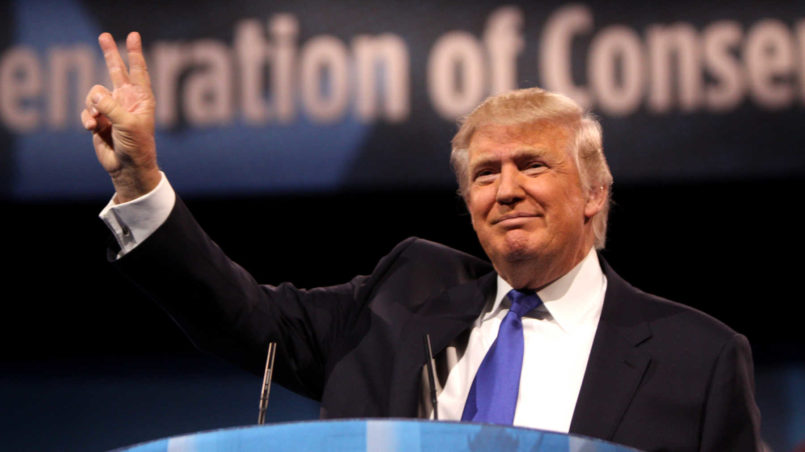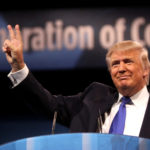Trump’s Presidency after the First Four Months

On Monday, May 29th, a review of Trump’s foreign policy since he took office was held at the Diplomatic Academy of Vienna. The speaker was James D. Savage who is active as a professor for international relations at the Academy and who has written four books on the budget administration of the USA, Iraq and the EU. Further he was an advisor in several American state organs such as the Court of Auditors and the Congressional Research Service which advises Congress members on drafting bills.
He began by stating that one of the reasons for Donald Trump’s election success was his role as a non-Establishment candidate. With the Establishment, those politicians who have been active in America’s political leadership for a long time are referred to, such as long-standing members of Congress.
Trump’s position on trade agreements is one of the few standpoints that he has not changed since his election. Even Bernie Sanders, one of the most well-known social democrats in America, shares Trump’s opinion that multilateral trade agreements are bad. Trump also criticised the Bush governments which is frowned upon by traditional Republicans,
As he is a non-Establishment President, he is openly criticised by the media which were supported by long-standing politicians. One does not like to see the existing system begin to sway. This is the price to be paid for him not being part of the political elite and for not having any experience at all in this field. Trump behaves as President as a businessman. An example is his arms deal with the government of Saudi Arabia in which the USA will supply weapons to the value of 350 billion US dollars to Saudi Arabia within the next ten years. It is also of note that Trump has not introduced any travel restrictions for the citizens of those Islamic countries which are profitable for him.
A path which other politicians such as ex-President, Jimmy Carter or the former New York Mayor, Michael Bloomberg took immediately: they chose blind trust for their companies.
For example, how, in the election campaign, he raised doubts as to the justification of NATO’s existence and now demands an excessively high increase of the military budget from the NATO members. This is also the case with Japan which he accused of currency manipulation and unfair conditions in the automobile industry in the election campaign.
As such, Trump was able to attain a position of power vis-à-vis Japan’s Minister President, Shinzō Abe as he is interested in the military support of the USA. Abe offered Trump a comprehensive investment package: Japanese companies will invest 400 billion US dollars in the USA. One sees that Trump’s strategy is successful but not, however, in Europe.
Germany’s Federal Chancellor, Angela Merkel made a stand against against Trump’s demands to increase Germany’s military spending. The relationships of the EU to the USA have worsened drastically as have the relationships between China and the USA. This is due to the fact that Trump, in his election campaign, threatened punitive duties and trade barriers. This could possibly lead to China and Europe becoming closer to each other economically.
As regards his climate policy, he is the opposite of Barack Obama. He supports the coal industry and would like to revive this in the USA. In the election campaign, he declared himself in favour of leaving the Paris Climate Protection Agreement – which he has in the meantime done. Trump has already issued a decree in which he has relaxed the strict CO2 targets of his predecessor.
In comparison, Obama had 69% supporters and was only rejected by 26% rejected. In general, the trust of the American population in politics has fallen.
At this point the talk ended and questions were posed.
It was asked why Trump does not support a violent removal of Syria’s President Assad. This question was answered by referring to the fact that, since the killing of Gaddafi, it has not been possible for the USA to develop a stable and democratic state in Libya. Currently the Islamic State and civil war dominates in the country. This has led to more refugees in Europe.
The fall of Gaddafi destabilised the state which nobody built up afterwards. Neither Obama nor Trump have the ambition or the knowledge to re-build broken states. And this is why also a violent removal of Syria’s Assad is not considered. A further reason being to prevent further waves of refugees towards the partners of Europe.
An interesting question was whether China would take over the economic leadership of the world if the USA acted in an overly protectionist manner. This could be the case if China wanted to invest in trade with Europe and developed the infrastructure for this.
At this point the question round ended in the Diplomatic Academy in Vienna.
Übersetzung Deutsch-Englisch: Donna Stockenhuber
Credits
| Image | Title | Author | License |
|---|---|---|---|
 |
Donald Trump | Gage Skidmore | CC BY-SA 2.0 |
